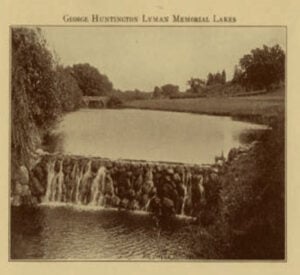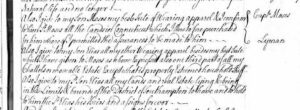 In 2017, my Uncle Lyman visited me in Northfield, Minnesota, while I was attending Carleton College. It was the summer before my junior year, and this was the first time anyone from my family had visited me on campus since freshman move-in day, so I was eager to give him the tour. Of course, the highlight of the tour was our walk around Lyman Lakes—two small, manmade lakes on the east side of campus. Lyman joked that they were named after him. It’s not the first time he’s made a similar joke—Lyman placenames tend to pop up everywhere we go. There’s a Lyman Lake in Washington, and a Lyman Lake State Park in Arizona. There are two Lyman ponds in Greater Boston, one of which is attached to the Lyman Estate in Waltham. When my uncle visits later this year, I’m sure we’ll visit both.
In 2017, my Uncle Lyman visited me in Northfield, Minnesota, while I was attending Carleton College. It was the summer before my junior year, and this was the first time anyone from my family had visited me on campus since freshman move-in day, so I was eager to give him the tour. Of course, the highlight of the tour was our walk around Lyman Lakes—two small, manmade lakes on the east side of campus. Lyman joked that they were named after him. It’s not the first time he’s made a similar joke—Lyman placenames tend to pop up everywhere we go. There’s a Lyman Lake in Washington, and a Lyman Lake State Park in Arizona. There are two Lyman ponds in Greater Boston, one of which is attached to the Lyman Estate in Waltham. When my uncle visits later this year, I’m sure we’ll visit both.
While these are just jokes, I have a feeling that there could be a touch of truth to them. If my uncle and I really have a familial connection to the picturesque lakes on my college campus, or the man who commissioned their construction, I’d like to know. A quick stop to my alma mater’s information page on the lakes supplied a good starting point for my research. The lakes were built around 1916-1917 in honor of George Huntington Lyman (1882-1902) of Minneapolis, Minnesota.1 A campus viewbook from 1926 named Lyman Lakes as the “George Huntington Lyman Memorial Lakes.”2
“Lyman” is an old, and not especially common, surname in the United States. While Lyman is neither my nor my uncle’s surname, my grandparents had decided to follow the old family tradition of using ancestral last names as their children’s first names.3 My uncle was named after his uncle, the first Lyman Chaffee, who was in turn named after his grandmother, Grace Lyman Chaffee (1874-1942), born in Boone, Iowa. George H. Lyman may not have been a direct ancestor of mine, but I felt, given the proximity and less-common nature of the name Lyman, that there was a high probability of finding a common ancestor.
 Using vital records on Ancestry.com, I was able to trace George and Grace’s paternal lines back to 17 th century Massachusetts, where they do indeed share an ancestor: Captain Moses Lyman (1690-1762) of Northampton, Massachusetts. Moses had several sons, but the eldest two were the relevant connections in this story:4 my ancestor, Deacon Elias Lyman (1715-1803) and Moses Lyman Jr. (1713-1768). Both are named in Capt. Moses Lyman’s probate records. Moses inherited his father’s best suit and a tract of land in Goshen, Litchfield, Connecticut, and Elias inherited the rest of his “wearing apparel besides my best suit which I have given to Moses,” a third of his household effects, and a parcel of land in Southampton, Massachusetts.5
Using vital records on Ancestry.com, I was able to trace George and Grace’s paternal lines back to 17 th century Massachusetts, where they do indeed share an ancestor: Captain Moses Lyman (1690-1762) of Northampton, Massachusetts. Moses had several sons, but the eldest two were the relevant connections in this story:4 my ancestor, Deacon Elias Lyman (1715-1803) and Moses Lyman Jr. (1713-1768). Both are named in Capt. Moses Lyman’s probate records. Moses inherited his father’s best suit and a tract of land in Goshen, Litchfield, Connecticut, and Elias inherited the rest of his “wearing apparel besides my best suit which I have given to Moses,” a third of his household effects, and a parcel of land in Southampton, Massachusetts.5
From Connecticut and Massachusetts, these two branches of the Lyman family moved west. Elias’s grandson, also named Elias Lyman (1798-1886) made his way to Ohio, where he married Hannah Cogswell Fiske (1800-1888) in 1838. Their son, Albert Taylor Lyman—Grace Lyman’s father—was born in 1845 in Mesopotamia, Ohio. At some point he must have lived in Iowa long enough to give birth to Grace, who married my great-great grandfather, Elmer Chaffee (1865-1953) in 1893. Their son Wilbur moved to Pasadena, California sometime between 1920 and 1929.
Moses Lyman Jr’s descendants stayed in Connecticut until at least the 1860s. Reverend Ephraim Lyman (1810-1880) and his wife Sarah Richards (1814-1904) were, according to the Star Tribune, pioneer residents of Minneapolis, Minnesota, where they moved around 1865. Their 24-year-old son George R. Lyman (1841-1932) went with them, and co-founded Lyman-Eliel Drug Co. in 1875 with his brother.6 He and his wife, Marietta, were trustees of Carleton College and gifted Lyman Lakes in memory of their late son. George Lyman Sr. died in Pasadena, California: the same town where his distant cousin, Wilber A. Chaffee Jr—Grace Lyman’s grandson and my grandfather—was probably just learning his first letters.
Notes
1 “Lyman Lakes” Accessed 5/13/2023 https://www.carleton.edu/do_you_know/lymanlakes.html
2 Carleton Viewbook (1926) is digitally available in Carleton Digital Collections: https://contentdm.carleton.edu/digital/collection/Archives/id/4801
3 And thank goodness, or else I never would have thought to look for this connection!
4 A third son, Issac Lyman, would go on to be a minister in York, Maine. His son Theodore founded a shipping company and made a fortune in the West Indies slave trade, which he used to commission the Lyman Estate in Waltham, MA.
5 Massachusetts Wills and Probate Records, 1635-1991. Hampshire County Probate Records Vol 10, 1761-1767, page 94.
6 "G.R. Lyman Dies in West Coast,” Star Tribune, 15 Jan. 1935.
Share this:

About Zobeida Chaffee-Valdes
Zobeida leads the volunteer program for Database Services and assists with creating and improving the database offerings on the American Ancestors website. She works with a large group of dedicated volunteers to accurately index historical records and make them accessible to a wide audience. She started her career with American Ancestors in 2023 as a Researcher, where she specialized in African American genealogy and family archiving projects. Her passion for archival studies and information science led her to join the Database team in 2024. Zobeida graduated from Northeastern University in 2023 with a Masters of Arts in Public History, with a certificate in Digital Humanities. While completing her degree, she worked for Boston African American National Historic Site, Essex National Heritage Area, and Northeastern University Archives and Special Collections. Zobeida graduated from Carleton College in 2019, where she studied History and Archaeology.View all posts by Zobeida Chaffee-Valdes →